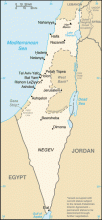Regional Background
Israel is a country in Western Asia located on the eastern shore of the Mediterranean Sea. It borders Lebanon in the north, Syria in the northeast, Jordan and the West Bank in the east, the Gaza Strip and Egypt on the southwest, and contains geographically diverse features within its relatively small area. Israelis the world's only predominantly Jewish state, with a population of 7.5 million people, of whom 5.7 million are Jewish. Arab citizens of Israel from the country's second-largest ethnic group, which includes Muslims, Christians, Druze, and Samaritans.
The modern State of Israel has its historical and religious roots in the Biblical Land of Israel, also known as Zion, a concept central to Judaism since ancient times. Political Zionism took shape in the late-19th century and the Balfour Declaration of 1917 formalized British policy preferring the establishment of a Jewish state. Following World War I, the League of Nations granted Great Britain the Mandate for Palestine and the responsibility for establishing "the Jewish national home" within it. In November 1947, the United Nations voted in favor of the partition of Palestine, proposing the creation of a Jewish state, an Arab state, and a UN-administered Jerusalem. Partition was accepted by Zionist leaders but rejected by Arab leaders, leading to civil war. Israel declared independence on 14 May 1948 and neighboring Arab states attacked the next day. Since then, Israel has fought a series of wars with neighboring Arab states, and in consequence occupies territories, including the West Bank and Gaza Strip, beyond those delineated in the 1949 Armistice Agreements. Israel has signed peace treaties with Egypt and Jordan, but efforts to resolve conflict with the Palestinians have so far only met with limited success and some of Israel's international borders remain in dispute.
Israel is a developed country and a representative democracy with a parliamentary system and universal suffrage. The Prime Minister serves as head of government and the Knesset serves as Israel's legislative body. The economy, based on the nominal gross domestic product, was the 41st-largest in the world in 2008. Israel ranks highest among Middle Eastern countries on the UN Human Development Index, and has one of the highest life expectancies in the world. Jerusalem is the country's capital, although it is not recognized internationally as such, while Israel's main financial center is Tel Aviv. In 2010, Israel was accepted as member to the OECD.





